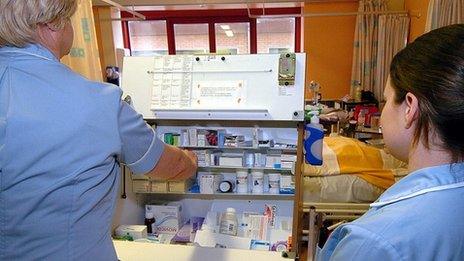NHS-life sciences partnership
- Published
- comments

There will be a £180m catalyst fund to help commercialise new medical treatments
There has been widespread speculation about how David Cameron plans to accelerate drug development for NHS patients.
One newspaper headline talked of plans to share patient records with private health care companies, "including some that use animals in clinical tests". It spoke to an unnamed senior executive of a drugs company which it described as "well-known for animal testing".
The plain fact is that all companies developing new medicines do animal research.
Another report spoke of "controversial plans" which could mean giving pharmaceutical companies more "freedom to run clinical trials inside hospitals".
Controversial perhaps, but this has been happening for years. GlaxoSmithKline, one of the world's biggest pharmaceutical firms, has a clinical trials unit within Addenbrookes hospital in Cambridge and a clinical imaging centre at Hammersmith hospital in west London.
So let's turn to the speech itself. It is partly a government response to the difficult economic times facing the life sciences industry.
This is a vital sector employing more than 160,000 people in 4,500 companies with an annual turnover of £50 billion. But in many areas it is struggling.
The innovation drugs pipeline is not flowing like it used to and the number of medicines in late stage development has declined.
Coupled to that are the soaring costs of conducting clinical trials.
I wrote last week about the dramatic decline in clinical trials in the UK, from 6% of the global total in 2000, to 1.4% last year.
This is not just a British problem. Other European countries are facing a challenge from the emergence of countries like India as trial venues.
The most tangible blow to pharma R&D came earlier this year Pfizer announced it was closing its research facility in Kent, which employs 2,400 people, and where the drug Viagra was developed.
So it's in that climate that the Prime Minister has now announced that life sciences in Britain are at a crossroads:
"Pressure on healthcare budgets in the West, emerging economies in the East, an ageing population, an explosion of knowledge - all creating a new paradigm for life sciences. And in this new paradigm, we must ensure that the UK stays ahead."
Mr Cameron says the coalition's strategy is to open up the health service to new ideas and for the NHS to be working "hand-in-glove with industry".
That has left some very uncomfortable, especially to plan to give greater access to patient records to the pharmaceutical industry.
The NHS already has a mass of hospital data available to researchers, but this plan would go further, adding GP records throughout England, all of which would be anonymised.
Shadow health secretary Andy Burnham expressed concern that it would put confidentiality at risk: "The Prime Minister has to tread carefully. What he calls red tape others might see as essential safeguards. Some areas need proper regulation and patient records is certainly one of them."
The devil will be in the detail here. It will certainly be of benefit to researchers to have comprehensive access to NHS data, but it would have to be anonymised in such a way that would prevent any attempt to de-code the data to identify individuals.
Mr Cameron has also announced a £180 million catalyst fund to help commercialise new medical treatments.
I'm told a key aim here is to help small teams of scientists - often in universities - to mount a "proof of concept" trial. This might cost half a million pounds and take the therapy to the point where investors or the pharmaceutical industry gets involved.
Downing Street also wants to accelerate the licensing process of experimental treatments so that patients with serious conditions like brain and lung cancer could get earlier access to medicines.
Bear in mind though that fewer and fewer British patients are benefiting from new therapies on clinical trials because of the shift overseas. And while £180 million will be welcomed, that is less than the cost of bringing one new medicine to market from start to finish.
- Published5 December 2011

- Published24 November 2011